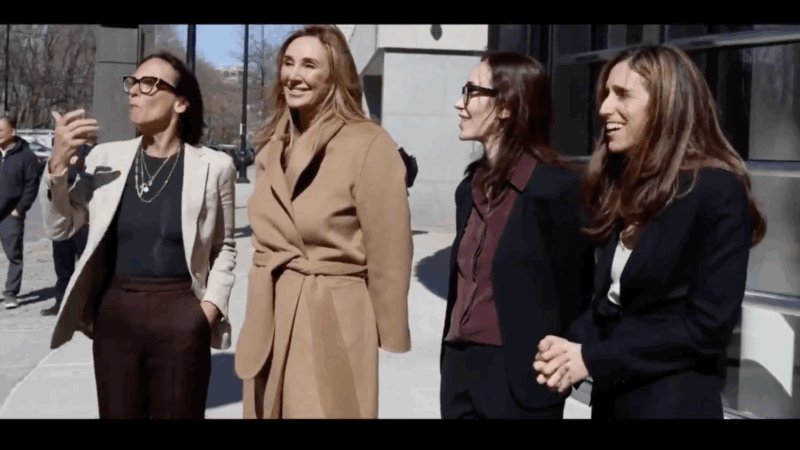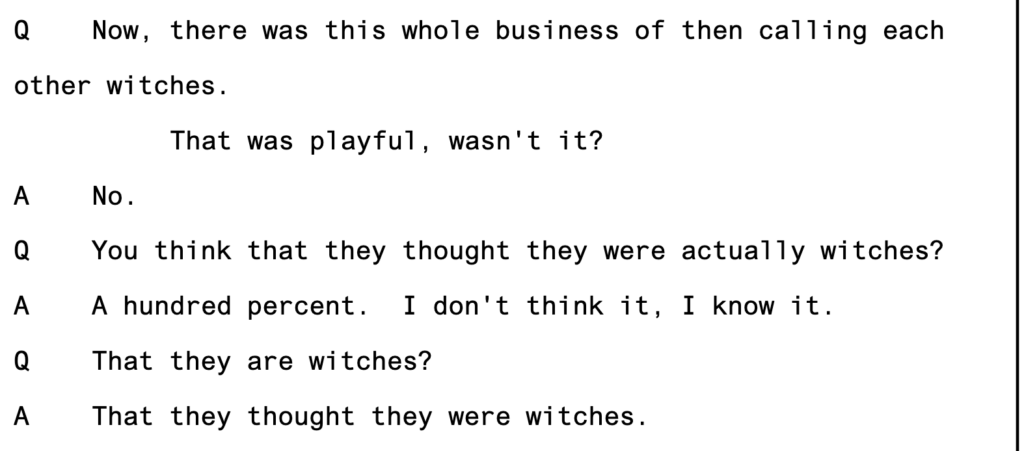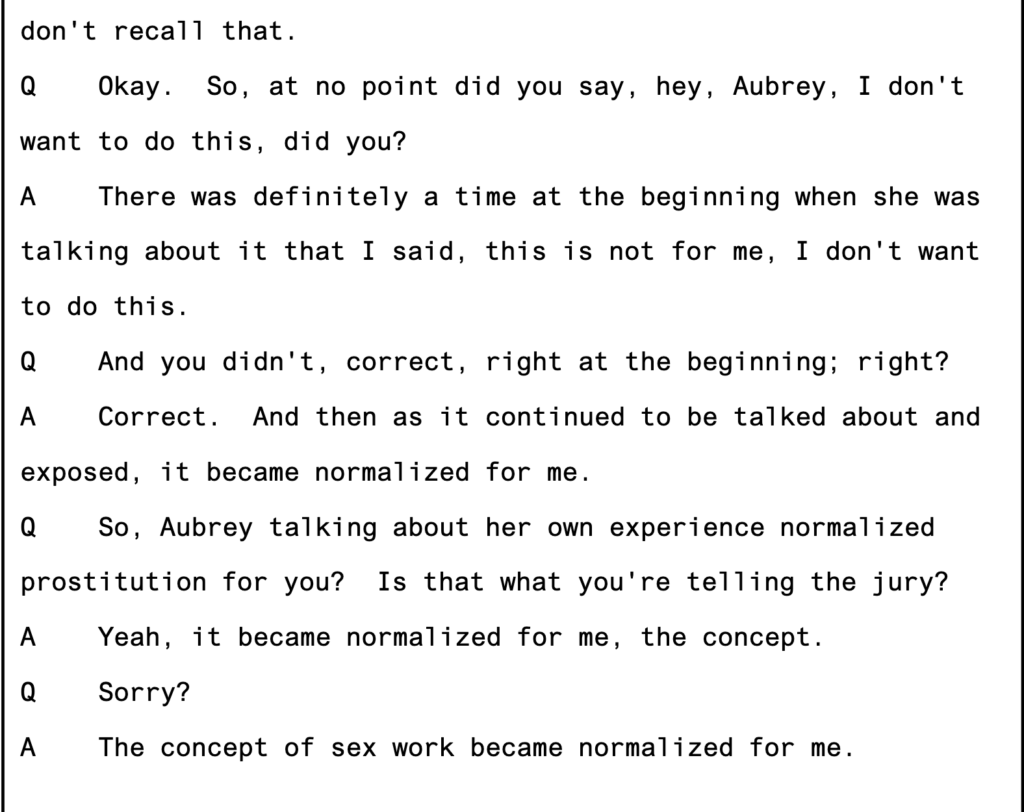A First Amendment Right To Preach Orgasm?
As the prosecution rests in the OneTaste case, the defense lays out the free speech implications if the government succeeds.

Yes, some people feared leaving OneTaste, defense lawyer Jennifer Bonjean admitted on Monday. "There was fear of being kicked out of the group chat."
Bonjean's client, Nicole Daedone, is co-founder of the sexual and spiritual wellness company OneTaste. Daedone and Rachel Cherwitz, OneTaste's former head of sales, are on trial for an alleged conspiracy to commit forced labor.
On Monday, the prosecution rested its very underwhelming case—a case that has invoked witchcraft, bad brain science, and a disturbing infantilization of women.
You are reading Sex & Tech, from Elizabeth Nolan Brown. Get more of Elizabeth's sex, tech, bodily autonomy, law, and online culture coverage.
Freedom of Association Under Attack
Typically, a forced labor case involves someone employing violence, threats of violence, or other means of "serious harm" in order to compel someone to work for them. But again and again, government witnesses—former OneTaste volunteers, employees, and community members—testified that they were entirely free to quit their positions, move out of OneTaste communes, or otherwise cease formal associations with the group without threat of physical harm or some sort of serious retaliation. They just didn't want to go because they feared being excommunicated from the OneTaste community, which they had become dependent on for their social, sexual, and spiritual identities.
The idea that this constitutes a "serious harm" that can sustain a forced labor charge "gets us into some very worrisome First Amendment issues, because the First Amendment protects people's right to assemble as they see fit," Bonjean told U.S. District Judge Diane Gujarati on Monday.
"Scientologists are permitted to fraternize with Scientologists. Churches are permitted to socialize with people that share their beliefs. They are permitted under the First Amendment to say, you don't share our beliefs, therefore you may not be part of our community," Bonjean said. "And OneTaste also—not just as a business but as a community—was permitted to say, 'we share these beliefs, we live by them ourselves, if you don't want to live by them, then you will have to leave.' Or 'you may be a customer, you can attend classes, you can be on the outer circles, but you…may not be in the inner circle, because…we don't want people who don't believe in these principles.'"
Those principles are much of what the government has been putting on trial. The prosecution's theory of the case is that OneTaste's teachings about things like sexual openness, openness to new experiences, personal responsibility, and the value of orgasmic meditation (O.M.)—a 15-minute, partnered clitoral stroking practice—left people powerless to reject living, working, or sexual situations they did not want.
Yet with government witness after government witness, the defense has produced evidence suggesting that discomfort or displeasure came only with hindsight. In the moment, these witnesses were effusive—on social media, in emails to OneTaste higher-ups, and so on—about the benefits of O.M. and OneTaste teachings more generally.
"What the government has alleged [and] the evidence has demonstrated is that there were people who participated in OneTaste and then later determined that they were psychologically harmed," Bonjean suggested to Gujarati on Monday. "Not that in the moment psychological harm was the reason they stayed."
'I Take No Responsibility'
Government witnesses testified about fears of losing "social status" and that there was "a high school clique situation gone bad and you could lose being closer to the cool kids," Celia Cohen, a lawyer for Cherwitz, told Judge Gujurati on Monday. "And people did testify that that was what was important. And if they didn't do this, they would lose that kind of status. But again, that is not serious harm."

Reading the transcripts from this trial, which started on May 5, it's clear many of the government's witnesses are now uncomfortable with choices they made while affiliated with OneTaste—things like deciding to go into debt or solicit money from a man to pay for courses; engaging in a lot of promiscuous sexual activity; or staying in a professional or volunteer role or a housing situation that eventually soured. And, whether intentionally or not, they seem to be looking for someone other than themselves to blame for these choices, even if they were mentally capable 20- and 30-something-year-old adults at the time.
One government witness, Michal Neria, talked about marrying Misha, a man who had been paying for her to take OneTaste courses and proposed to her at a OneTaste event. Cherwitz allegedly suggested to Neria "that I could ask him to pay and that it's completely his decision whether to say yes or no," Neria testified on May 22. "Rachel and the other higher-ups put that idea in my head. I would have never come up with it by myself."
"So, you take no responsibility for asking Misha to pay for your courses?" Bonjean asked.
"I take no responsibility," Neria said.
Bonjean then asked Neria if she could agree that she did not have to ask Misha to pay for her courses. "Then I wouldn't have been able to take those courses," Neria replied.
So, Neria did something that benefited her at the time ("I really wanted to take that course," she told the court) or made her feel more socially accepted ("I saw other people who have gotten married and…I wanted us to be like them"). But after it didn't work out—the marriage to Misha quickly ended in divorce and Neria stopped associating with OneTaste—she seems to have totally absolved herself of any agency in her actions.
Neria even brought up witchcraft, telling the court that "pretty much all of the staff, all of the female staff" were considered witches.

'My Brain Wasn't Fully Developed'
Another government witness, Dana Gill, took a less mystical and more pseudo-scientific approach to explaining her time at OneTaste: "My brain wasn't fully developed."
Gill was 25 years old and a college graduate when she started to associate with OneTaste. "I was so young, you know," she told the court on May 14. "My prefrontal cortex wasn't done developing."
The suggestion here is that a 25-year-old woman is too young to legally make decisions for herself—an implication that could have serious consequences far beyond this prosecution.
But believing that 25-year-olds aren't culpable for their actions isn't Gill's only unusual idea; she also seems to think that it's coercive to talk about or do things in front of her.
While at OneTaste, Gill entered into a sham marriage with someone who needed a green card, getting paid $10,000 for it. She told the court that she only did this because a few other people she knew in OneTaste (neither of the defendants) had green card marriages and this "normalized" the idea for her.
Likewise, Gill—who is now a Methodist pastor—became a sugar baby and then started doing sex work because her friend in OneTaste, Aubrey, was doing it, Gill testified. "Aubrey talking about her own experience normalized prostitution for you?" Bonjean asked Gill. "Yeah, it became normalized for me," Gill replied.

She went on to suggest that hearing Aubrey—a friend who is not either of the defendants, mind you, or even in OneTaste leadership—describing her own positive experiences with sex work amounted to "coercion over a period of time."
Back in 2011, she told podcaster Mai Vu that she had to keep her sex work "hush hush" around people at OneTaste. She also said then that sex work "was one of my favorite jobs ever. Like, I love having sex and I got paid to have sex with…random men." And that was "really thrilling." Asked in court to explain the discrepancy in how she talks about sex work now and how she talked about it back then, Gill blamed OneTaste for having "celebrated and embraced" her sexual side and given her "all of this positive reinforcement around having sex and being a sexual person."
At the time, "I was like, oh, yeah, I'm going to keep leaning into that," she told the court. But "it was not freeing, in fact, in hindsight."
That's It?
As the prosecution rested its case, I couldn't help but think: That's it? I knew going in that this case was weak, but the court proceedings have really driven home just how weak. Basically, it's been a parade of adults—men and women, but mostly women—infantilizing themselves while granting almost superhuman power to Daedone and Cherwitz.
Again and again, government witnesses testified about freely choosing to work for OneTaste, to live in OneTaste housing, and to sign up for OneTaste classes and programs. The consequences they experienced, or feared, from going against bosses or rejecting community practices are the kinds of things you might expect in any job or communal living situation: disapproval, disappointment, diminished opportunities. The reasons they gave for staying even when they were unhappy also fall more within "yes, that's life," than a criminal scope. One witness testified that she couldn't leave right away because she didn't have a lot of money saved or another job lined up.
Many witnesses seemed willing, intentionally or not, to rewrite history. For instance, government witness Anthia Gillick said she felt like she wasn't able to take vacations; the defense provided evidence, which she did not dispute, that she traveled to the Hamptons, San Francisco, Bali, and Antarctica while involved with OneTaste. Gillick also claimed she didn't seek medical attention after suffering an aerial silk injury (unrelated to OneTaste) because Cherwitz allegedly discouraged it. On cross, she admitted that she had actually seen a doctor, an acupuncturist, and a masseuse.
Gill told the court about allegedly being directed by Cherwitz to engage in sexual activity with Antonios Hadjigeorgalis, a student in a OneTaste coaching program in 2010. Hadjigeorgalis "was getting ready to withdraw from the coaching program, and I was told to go make sure that he stayed in the coaching program," she said in her May 13 testimony. While no one explicitly told her to hook up with him sexually, that was "my interpretation of what was asked of me," she said.
Hadjigeorgalis testified in court on Monday. He was in San Fransisco once during the coaching program, in November 2010, and said that during that visit Dana came to his room and they engaged in sexual activity. He had not, at this point, had any intention of dropping the program, he told the court, and dropping out was not something he brought up with OneTaste staff until January 2011.
Sometimes, the government precluded the defense from having the opportunity to challenge negative statements. Such was the case when it came to Ayries Blanck, the government's star witness until she admitted that she was untruthful with prosecutors and had fabricated evidence. Prosecutors subsequently decided not to have Blanck testify.
But, on Monday, they had an FBI agent and a prosecutor read text messages sent between two former OneTaste staff members, Joanna Van Vleck and Kenan Wang, about Blanck threatening the company with a lawsuit. The texts included some of Blanck's allegations, which meant the jury was exposed to these claims.
The judge told the jury these texts were being read not for their truth but merely for context. And since Blanck herself wasn't testifying, the defense had no opportunity to question her directly or challenge her claims in front of the jury.
'Psychologically Entrapped'
The government contended in court on Monday that it doesn't matter if people weren't actually physically trapped at OneTaste. "I know there's been arguments that people were free to leave at any time. That's not an element of the [forced labor] statute," said U.S. Attorney Nina C. Gupta. "The fact that people were physically free to leave doesn't speak to the fact that they felt psychologically entrapped."
Notice the word felt there. That's what this case comes down to: feelings. Not facts about anything the defendants did but the way witnesses—10, 15, 20 years later—now feel about their lives during this time.
"Of course it matters [that they could] not only physically leave, but they could leave without any real repercussions," Bonjean replied in court. "Nobody has identified a single repercussion other than Nicole might be mad at me, I would be kicked out of the circle, or that I wouldn't be able to be a part of the community."
"Really what they were afraid of most is conduct that is protected by the First Amendment," said Bonjean. "So that type of fear is not the type of fear that was contemplated by the lawmakers when they passed [forced labor] legislation." Physical violence and threats of it are "the type of coercion that the lawmakers had in mind, not some type of social coercion or fear that you're going to be kicked out of the group, and that is what we've heard of."
On Tuesday, the defense rested its case, having called just one witness. "I want to make the record very clear. We have plenty of witnesses that we would have presented, but it's very clear that what we want to present, the Court has disagreed would be admissible," Bonjean told the judge.
Neither Cherwitz nor Daedone elected to testify.
Closing arguments in the case will begin today.
More Sex & Tech News
Ohio targets drag performers. An Ohio bill would limit "adult cabaret performances," which it defines as performances "harmful to juveniles" that feature go-go dancers, strippers, or "entertainers who exhibit a gender identity that is different from the performers' or entertainers' biological sex."
Free speech for me, but not for thee. The Free Press' editors champion the ban on TikTok.
Pas de porno pour toi. Pornhub is suspending service in France in light of a new law that requires adult websites to verify all visitor ages.
Can an egg yolk be pornographic? On obscenity and over-easy eggs
Library bill dead. An Alabama bill targeting libraries for obscenity prosecutions has failed.
Today's Image



Show Comments (36)